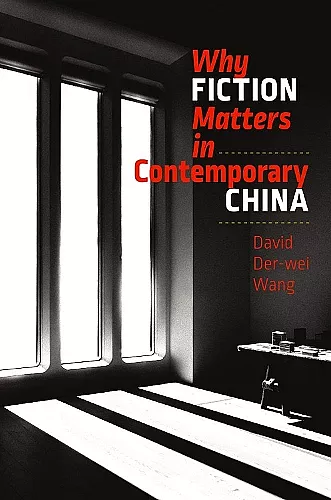Why Fiction Matters in Contemporary China
Format:Paperback
Publisher:Brandeis University Press
Published:5th Feb '21
£28.00
Available to order, but very limited on stock - if we have issues obtaining a copy, we will let you know.

Contemporary discussions of China tend to focus on politics and economics, giving Chinese culture little if any attention. Why Fiction Matters in Contemporary China offers a corrective, revealing the crucial role that fiction plays in helping contemporary Chinese citizens understand themselves and their nation. Where history fails to address the consequences of man-made and natural atrocities, David Der-Wei Wang argues, fiction arises to bear witness to the immemorial and unforeseeable.
Beginning by examining President Xi Jinping’s call in 2013 to “tell the good China story,” Wang illuminates how contemporary Chinese cultural politics have taken a “fictional turn,” which can trace its genealogy to early modern times. He does so by addressing a series of discourses by critics within China, including Liang Qichao, Lu Xun, and Shen Congwen, as well as critics from the West such as Arendt, Benjamin, and Deleuze. Wang highlights the variety and vitality of fictional works from China as well as the larger Sinophone world, ranging from science fiction to political allegory, erotic escapade to utopia and dystopia. The result is an insightful account of contemporary China, one that affords countless new insights and avenues for understanding.
“The work of Sinophone writers… significant amounts of it readily available in English, deserves far closer engagement than it currently receives. Wang’s study, elegantly written in its own right, is a masterful guide with which to start." * China Books Review *
“One of Wang’s goals is to encourage readers to see how Xi’s concern with storytelling fits into a grand Chinese tradition that posits literature as central to the lifeblood of the nation. This tradition, however, was once rooted in plurality: even Mao, in his early years, thought there was more than one 'good China story' – and this meant generically, stylistically, even ideologically. Xi, however – like Mao in his later years – has stricter criteria for what constitutes “good”, and this has had a catastrophic effect. Today, Wang finds the alternative Chinese storytelling spirit of Liang and New Youth residing largely in the country’s exiles, such as the dissident Ma Jian, who has long been based in London." * TSL *
"Wang illustrates that poetic allusion and ambiguity are ways of offering alternative Truths. In China, then, fiction matters as an alternative way of and a response to speaking Truth—dark as it is, Chinese fiction begets hope and light." -- Barbara Mittler, Heidelberg University
"Wang shows us that storytelling, as transgression, transmigration, and transillumination, can speak back to and subvert the state's mandate for 'telling [only] a good story of China.' A timely observation on contemporary China and its literature, it is necessary and it inspires." -- Mingwei Song, Wellesley College
"Why Fiction Matters in Contemporary China is both a testament to the inexhaustible energy and innovation with which contemporary authors have approached the task of 'telling the good China story,' and also product of Wang’s own irrepressible dedication to 'telling the good story' about the relationship between modern Chinese literature and the social orders that inspire and are shaped by it." -- Carlos Rojas, Duke University
"Insightful, informative, intellectually stimulating—and above all, inspiring." -- Sung-sheng Yvonne Chang, Professor, The University of Texas at Austin
"Wang brilliantly illustrates the impact and relevance of storytelling for the nation and people’s everyday lives in China today. This is a hard-hitting book that excavates the complex relationship between politics and narration, the national imperative and the cultural imagination. If I had to recommend a single book on contemporary Chinese literature, this would be it." -- Michael Berry, Director of the UCLA Center for Chinese Studies
ISBN: 9781684580279
Dimensions: 237mm x 156mm x 17mm
Weight: 356g
296 pages